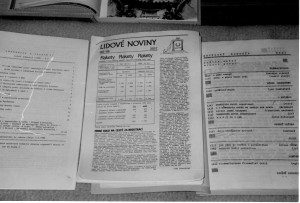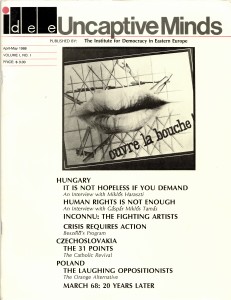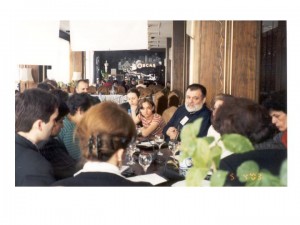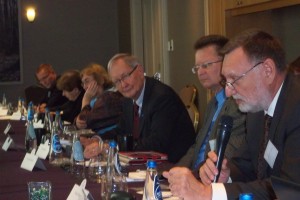
Ivlian Haindrava, a leader of the Republican Party in Georgia, speaks at IDEE’s seminar, “Reflections on Unfinished Revolutions: 25 Years After 1989-91,” in Warsaw, October 2014.
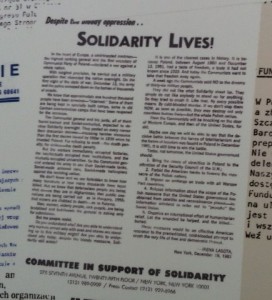
A flyer of the Committee in Support of Solidarity reproduces Irena Lasota’s speech at the Committee’s December 19, 1981 demonstration.
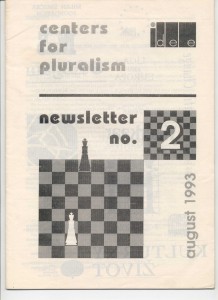
The 2nd issue of the Centers for Pluralism Newsletter (1993), providing useful information and contacts to civic organizations throughout the region.
IDEE: A Brief History
The Institute for Democracy in Eastern Europe (IDEE) is one of the most experienced and accomplished non-governmental organizations active in the region. IDEE was created in 1985 by members of the Committee in Support of Solidarity, which was founded in December 1981 to assist the Solidarity movement in Poland after the imposition of martial law. IDEE set out to expand the work of the Committee by organizing assistance to the growing underground and opposition movements seeking human rights, democratic change, national independence, and an end to communism in other countries of Eastern Europe.
In its initial period, IDEE provided direct financial and material assistance to hundreds of independent publications and to dozens of human rights and opposition groups that were at the forefront of the 1989–91 revolutions in Central and Eastern Europe, the Baltic countries, Belarus, and Ukraine. It also supported dissident publications in Yugoslavia (Naśa Reć) and the Soviet Union (Kontinent).
In 1988, IDEE also began the publication Uncaptive Minds, a journal of information and analysis of the region that featured documents of the democracy and human rights movements and articles by and interviews with those in the region trying to bring about democratic change. Uncaptive Minds was published from 1988 to 1997 (nine volumes, 34 issues) and remains the most authoritative journal in English on the post-communist region during this period (see www.idee.org/um.html).
Through Uncaptive Minds and other publications, its advocacy work, and its other initiatives, IDEE served as an information gateway for dissidents and semi-clandestine democratic movements to the West; it provided individuals and groups in the region with information and experiences about opposition in other countries; and it assisted Western trade unions, foundations, and governments in making contacts and developing programs in the region. Many institutions that later worked in the region made their first contacts through IDEE.
After 1989–91, IDEE helped democrats in the region in their efforts to dismantle communism’s legacy, build democratic institutions, foster a plural and open society, and combat anti-democratic trends and forces in the region. At first, IDEE organized programs supporting development of civil society, independent media, human rights monitoring, and citizens’ participation in Central and Eastern European countries (Bulgaria, the Czech Republic and Slovakia, Estonia, Hungary, Lithuania, Poland, Romania). Soon, however, IDEE’s efforts expanded eastward to other countries of the former Soviet Union as well as former Yugoslavia. Overall, IDEE worked directly in 24 post-communist countries in the region and its programs reached civic and democracy activists in all thirty post-communist countries. (Descriptions of many of its programs from 1992 to 2010 are posted at IDEE’s original web site at www.idee.org/programs.html and are linked individually below.)
As an integral part of its overall work, IDEE launched the Centers for Pluralism in 1992, a unique program to promote civic development, cross-border cooperation, and sharing of experiences in the post-communist region through a regional network of non-governmental organizations and individuals dedicated to principles of liberal democracy and pluralism. It was the first and longest-lasting network of democratic activists in the region. Starting with representatives of civic and pro-democracy groups from six East-Central European countries, the network grew to include activists from twenty-four post-communist countries having the aims of consolidating and expanding liberal democracy throughout the region and of sharing the varied experiences of the transitions from communism with themselves and those seeking democratic change in other countries.
Through annual and regional meetings, publications (especially the Centers for Pluralism Newsletter, internships and exchanges, democracy seminars, grants, common programs, and other initiatives, the CfP program helped thousands of organizations in all thirty former communist countries (including all countries of the former Soviet bloc, or Warsaw Pact, all countries of former Yugoslavia, as well as Albania, and Mongolia). Many of the groups that formed the Centers for Pluralism emerged as among the region=s most effective civil society organizations in their countries. The CfP program also developed many cross-border and cross-regional programs aimed at supporting democracy movements and opposing antidemocratic forces and regimes. The Centers for Pluralism was funded until 2003 by the National Endowment for Democracy, at which time it suspended support. Since 2003, the CfP program has lacked direct funding, but the Centers for Pluralism has continued as an active network of democrats in the region and its members have participated in many of IDEE’s other programs (see below).
For more than twenty years, IDEE has focused particular attention on countries and regions where the fall of communism did not result in democratic transition but instead brought continued dictatorship or war, including Armenia, Azerbaijan, Belarus, Central Asia, Chechnya, Georgia, Ukraine, Uzbekistan, and former Yugoslavia. IDEE helped to build and to support democratic and civic forces in all of these countries and regions through direct support, exchanges, and a variety of innovative programs, such as Democratization in Azerbaijan (1998–2002), Breaking Barriers, Building Bridges and Civic Bridges in former Yugoslavia (1997–2003), Networking Women in the Caucasus and Networking Women in Central Asia (1998–2003), Democracy for Cuba (1995-2011), Networking of Civic Activists in Uzbekistan (2007–08) and Raising Consciousness for Freedom in Belarus (2007–2010).
Drawing on its Centers for Pluralism network and its broader network of democratic activists built since 1985, IDEE also organized election monitoring programs in a number of countries, including Azerbaijan in 2003, when its mission of 188 observers chronicled the massive fraud committed by the regime to prevent the victory of the united candidate of the democratic forces. In 2012, IDEE organized an international monitoring team of 80 Eastern Europeans to observe the Georgian parliamentary elections.
As part of the Centers for Pluralism and other programs, IDEE focused particular attention on supporting the Crimean Tatars, whose democratic culture and practices are a model in the Muslim world, during and following their return to their homeland on the Crimean peninsula after nearly 50 years of forced exile. Starting in 1991, IDEE organized programs aiding civil society and education and defending the rights of Crimean Tatars. IDEE continues to support the Crimean Tatars as they face renewed repression and existential threat under Russia’s illegal occupation of the Crimean peninsula.
Starting in 1995, IDEE expanded its work to Cuba, the only member of the Soviet Bloc in which there was no transition from communism. In addition to providing direct support for dissidents and opposition groups on the island it developed ongoing programs for Eastern Europeans to meet and support their counterparts in Cuba. From 2005 to 2011, it carried out a comprehensive program called Democracy for Cuba that included exchanges, publications, a web site, and direct support for civic groups in Cuba.
Both before 1989–91 and afterwards, IDEE has worked with a broad network of democrats and civic activists to develop and carry out many original programs—which other donors and practitioners often tried to replicate—including small grant programs, local press competitions, cross-border and regional training, internships and exchanges, and various education and funding initiatives. Overall, IDEE has administered more than $25 million in public and private grants and implemented more than one hundred programs that have directly assisted more than 3,000 publications, civic and human rights organizations, political groups, and opposition movements in twenty-four post-communist countries as well as Cuba.
In 2014, IDEE launched a new initiative to address the lack of democratization in the post-communist region, “25 Years After 1989: Time for Reflection on Unfinished Business.” As a first step, IDEE gathered 22 veterans of the 1989–91 Revolutions in a unique seminar with the aim of analyzing the many political, social, and economic deficits in the region, especially in light of the Russian Federation’s increased aggression and annexation of the Crimean peninsula, and developing new strategies for addressing this unfinished business. IDEE has issued a Special Seminar Report and also published the full proceedings as a special issue of Uncaptive Minds. Read More.
Note: IDEE is preparing its archives for the period 1985–2015 for deposit at the Hoover Institution Archives at Stanford University as well as a general history of the activities and programs of the organization. The archives of the Committee in Support of Solidarity have already been deposited at the Hoover Institution. The general history and some of the digital archives of both the Committee in Support of Solidarity and the Institute for Democracy in Eastern Europe will be posted on IDEE’s new web site — under the Archives tab — as this work proceeds.

